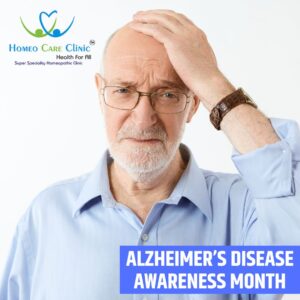Introduction
National Alzheimer’s Disease Awareness Month is observed every November to increase public awareness about Alzheimer’s disease, a neurodegenerative disorder that affects millions of individuals worldwide.
Epidemiology
Alzheimer’s disease is a global health concern. According to the World Health Organization (WHO), approximately 50 million people are living with dementia, with Alzheimer’s being the most common cause. By 2050, this number is expected to reach 152 million. It predominantly affects older individuals, but early-onset Alzheimer’s can also occur.
Causes
The exact cause of Alzheimer’s disease is not fully understood, but it is believed to be a complex interplay of genetic, environmental, and lifestyle factors. Abnormal protein deposits in the brain, such as amyloid plaques and tau tangles, are associated with the disease.
Symptoms
Alzheimer’s disease is characterized by progressive cognitive decline, including memory loss, impaired reasoning, and changes in behavior. As the disease advances, individuals may struggle with basic tasks, have difficulty recognizing loved ones, and exhibit personality changes.
Preventive Measures
1. While there is no guaranteed way to prevent Alzheimer’s disease, several lifestyle choices may reduce the risk of developing it:
2. Maintain a healthy diet rich in fruits, vegetables, and omega-3 fatty acids.
3. Engage in regular physical exercise.
4. Stimulate the brain with intellectual activities.
5. Manage cardiovascular risk factors like high blood pressure and diabetes.
6. Stay socially active and connected.
Homeopathic Management
Homeopathy is a holistic system of medicine that aims to stimulate the body’s natural healing processes. Homeopathic remedies may help manage its symptoms and improve the overall well-being of affected individuals. It is essential to consult a qualified homeopathic practitioner for personalized treatment, as remedies are selected based on an individual’s specific symptoms and constitution.
Here are five commonly used Homeopathic medicines for Alzheimer’s disease:
1. Anacardium Orientale: Suggested for those with memory problems, difficulty concentrating, and low self-esteem. It may help improve cognitive function.
2. Baryta Carbonica: Useful for individuals who experience confusion, forgetfulness, and have a fear of strangers. It may also assist with slowing cognitive decline.
3. Lycopodium: Recommended for memory issues, anxiety, and digestive problems that often accompany Alzheimer’s disease. It may offer relief from these symptoms.
4. Gelsemium: Suitable for individuals with nervousness, trembling, and weakness. It may help reduce anxiety and improve mental clarity.
5. Phosphoric Acid: Indicated for individuals with mental exhaustion, apathy, and loss of memory. It may help enhance cognitive functioning and energy levels.
In conclusion, Homeo Care Clinic offers a holistic approach to treating Alzheimer’s disease. The remedies mentioned above can treat the underlying causes of the condition and offer relief from the discomfort. However, it is important to consult a qualified homeopathic practitioner for the correct dosage and duration of treatment. Homeo Care Clinic provides comprehensive care for various ailments, including Alzheimer’s disease, and offers customized treatment plans based on individual requirements.
To schedule an appointment or learn more about our services, please visit our website or give us a call. Our friendly staff will be happy to assist you.
Follow us on Facebook, Twitter, and Instagram for valuable insights into the world of homeopathy and holistic health.
Facebook – https://www.facebook.com/homeocareclinicpune
Instagram – https://www.instagram.com/homeocareclinic_in






